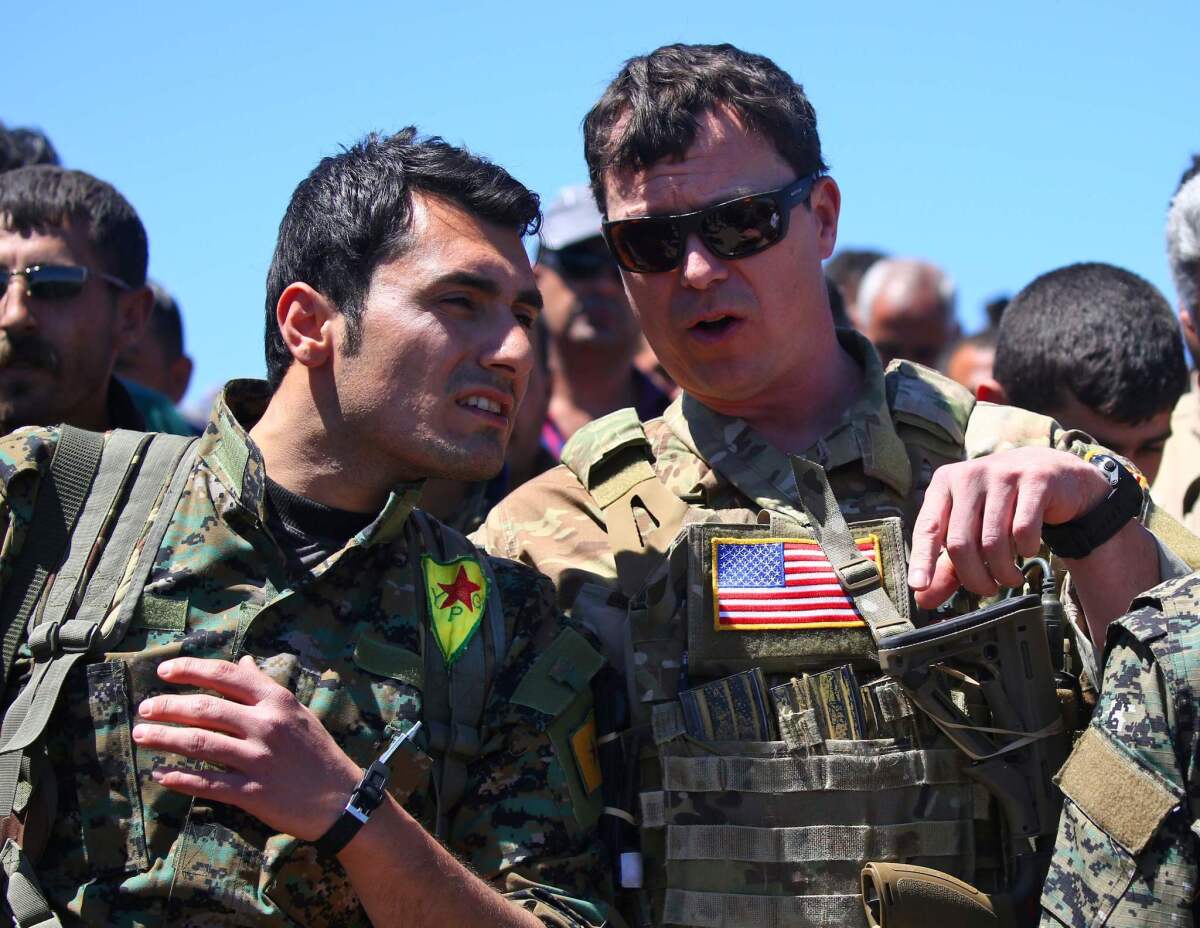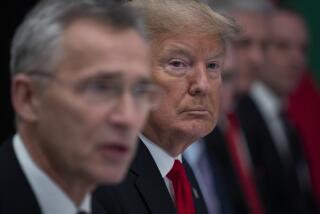Column: The Trump Doctrine is simple: Allies can’t trust him

President Trump betrayed an American ally this week. It wasn’t the first time and it probably won’t be the last.
The victims this time were the Kurds, the minority ethnic group that provided most of the ground troops for the U.S. war against the militant group Islamic State in Syria. More than 11,000 Kurds died in that campaign. The number of U.S. combat deaths reported in Syria: six.
Trump’s betrayal was his failure to defend the Kurds against one of their mortal enemies: Turkey. Last weekend, Turkish President Recep Tayyip Erdogan told Trump he intends to send his army into northeastern Syria, where the Kurds have carved out a semiautonomous enclave near the border.
Trump’s response was, in effect, “OK by me.” He wants to get the last 1,000 U.S. troops out of Syria, and doesn’t seem to care much what happens after that. He told reporters it was time to get out and let others “figure the situation out.”
To the president’s surprise, Republicans revolted.
“The biggest lie being told by the administration is that ISIS is defeated,” said Sen. Lindsey Graham (R-S.C.), one of the president’s golf partners, using an acronym for Islamic State. “This is going to lead to ISIS’ resurgence.”
So the president rolled his decision partway back — although nobody in his administration seemed to know what his new position was.
“We may be in the process of leaving Syria, but in no way have we Abandoned the Kurds, who are special people and wonderful fighters,” Trump insisted in a tweet.
Tell that to the Kurds, who fear they have been left defenseless in the face of the larger and more powerful Turkish army.
Then explain to the Kurds why they should continue guarding 12,000 imprisoned Islamic State militants if Turks begin invading Kurdish villages.
Before he reconsidered, Trump argued that he doesn’t owe anything to the Kurds despite Pentagon promises to them while they helped prevent Islamic State from becoming a direct threat to the United States.
“The Kurds fought with us, but were paid massive amounts of money and equipment to do so,” he tweeted.
The Kurds weren’t allies, it turns out; in Trump’s view, they were subcontractors.
Trump dismissed them the same way he dismissed the painters, carpenters, piano tuners and other contractors he underpaid or refused to pay on hotel projects in Las Vegas and Atlantic City: They should be glad they got paid anything at all.
The president’s disdain isn’t new. He’s abandoned allies before.
Last December, he abruptly announced that he was pulling all U.S. troops out of Syria, prompting Defense Secretary James N. Mattis to resign in protest. “You’re going to have to get the next secretary of Defense to lose to ISIS,” he told Trump.
This summer, the president blocked nearly $400 million in military aid to Ukraine, a U.S. ally fighting a Russian-backed insurgency. House Democrats are examining whether he withheld the arms to get Ukraine to dig up dirt on a potential 2020 political rival, former Vice President Joe Biden.
In Europe, Trump has repeatedly questioned why the United States is still in the North Atlantic Treaty Organization, the 29-nation defense alliance that has protected the continent for 70 years — and which rushed to America’s aid in Afghanistan after 9/11.
He’s questioned the U.S. military alliance with Japan, complaining that Japan exports cars to the United States but isn’t required to defend our shores.
“Our allies take advantage of us far greater than our enemies,” he said en route to a recent summit — with our allies.
The lesson, German Chancellor Angela Merkel said last year, is that Europe can no longer rely on the United States as a partner.
Trump treats domestic political allies that way, too.
In 2017, when his campaign to repeal Obamacare ran into trouble, he blamed House Republican leaders for passing an unpopular bill that he called “mean” — even though they had passed it with his approval.
And this week, as Trump announced his retreat in Syria, GOP senators said none of them had been consulted in advance — not even Graham, who had slavishly made himself a one-man cheering section for the White House.
Even though they were on recess and away from Washington, GOP senators took time to try to tutor the president in some basic principles of international relations.
“Honorable nations stand by their friends,” Sen. Ted Cruz (R-Texas) tweeted. “Our enemies and rivals (Iran, Russia, etc.) don’t abandon their allies. If we want allies to stand with America in the future, we shouldn’t either.”
“By abandoning the Kurds we have sent the most dangerous signal possible: America is an unreliable ally,” Graham wrote. “This decision makes it difficult for the U.S. to recruit allies against radical Islam.”
The president chose an odd time to remind Republican lawmakers of his mercurial nature. The Senate may soon be sitting as a jury in his impeachment trial. He could use some allies over the next few months.
Instead, he’s taught the senators, as well as the Kurds, a useful lesson: You can offer your loyalty to Trump. Just don’t expect any in return.
More to Read
Get the L.A. Times Politics newsletter
Deeply reported insights into legislation, politics and policy from Sacramento, Washington and beyond. In your inbox three times per week.
You may occasionally receive promotional content from the Los Angeles Times.







